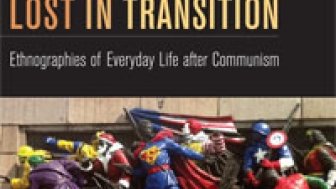Kristen R. Ghodsee
Fellow
Professional Affiliation
Assistant Professor, Gender and Women's Studies, Bowdoin College
Expert Bio
As a graduate student in the late 1990s, I spent 14 months living in Bulgaria doing research on women's labor in the tourism industry in Bulgaria. I was fascinated by the multiple strategies that Bulgarian women were employing to survive the chaos of economic transition, and the apparent success that Bulgarian women working in tourism seemed to be having. This research culminated in my book, The Red Riviera: Gender, Tourism and Postsocialism on the Black Sea. For that project I spent a lot of time traveling around the country, but focused my research in four major resorts: the beach resorts of Golden Sands and Albena, and the ski resorts of Borovetz and Pamporovo. Pamporovo is situated in the heart of the Slavic Muslim community and over the years since I started research in Bulgaria in 1998, I have been intrigued by the steadily growing number of mosques being constructed in the countryside. In otherwise dilapidated villages suffering from unemployment rates of over 35 percent of the population there would appear shining new domes and spires. Where, I wondered, was the money coming from?
Since I was already involved in the tourism project, I did not have the time to pursue this line of research until recently. In the summer of 2004, I returned to the Smolyan region and began informally talking to the locals about the many new mosques. Some of the women confided that the new buildings were "tearing their communities apart." These moderate Muslim women felt threatened by the Saudi Arabian, Jordanian and other Arab missionaries who were using foreign funds to set up religious schools and build mosques in the region. They perceived the call to practice the "true" form of Islam as a threat to the traditional independence of Bulgarian Muslim women, particularly that generation of women who were raised under communism.
At the same time, serious conflicts were emerging within the Bulgarian Muslim population as a whole, and allegations were exchanged between rivaling Muslim leaders that some Bulgarian muftis were allowing foreign missionaries to operate illegal Islamic schools in the Pomak regions and were recruiting young Bulgarian men to be "terrorists." Indeed, there have been reports of individuals with Bulgarian passports being captured as part of the insurgency in Iraq and of Bulgarian citizens recruiting potential insurgents in Germany. Both the German and Bulgarian governments are concerned with the possibility that Islamic fundamentalists will gain a strong foothold in Bulgaria, a country slated to join the European Union in 2007. It is within this context of heightened national security concerns about Bulgaria's Slavic Muslim population, that I decided my next project would be to understand to what extent these reports are true, and if they are true, what roles are women playing in resisting (or supporting) the increasing importation of Wahhabi ideologies.
Education
B.A. (1993) University of California, Santa Cruz - Theatre Arts (Playwriting) and Literature (Creative Writing) Honors in Literature; M.A. (1997) University of California, Berkeley - Social and Cultural Studies in Education; Ph.D. (2002) University of California, Berkeley - Social and Cultural Studies in Education with a Designated Emphasis in Women, Gender and Sexuality
Expertise
Women and gender in postsocialist societies; tourism and economic development; women's nongovernmental organizations in developing and transitioning economies; moderate Muslim women's resistance to Wahhabi Islam in postsocialist Bulgaria
Wilson Center Project
"The Miniskirt or the Veil: Bulgarian Muslim Women Resisting Islamic Fundamentalism in Southeastern Europe"
Project Summary
My research examines postsocialist Muslim women resisting the importation of Wahhabi (fundamentalist) Islam into Southeastern Europe. Bulgaria's Muslim community has historically professed a very moderate version of Islam, but as the economic situation in the region deteriorated after the collapse of Bulgarian communism in 1989, proponents of a more fundamentalist version of the religion have secured international aid to build new mosques, provide job training and create schools throughout the region; their efforts have met strong resistance from older Muslim women raised under communism to believe in the total equality of men and women. Through in-depth interviewing and participant-observation, I am researching the specific shapes this resistance takes today, and whether or not this generation of postsocialist women is being successful in diluting the Wahhabi influence in the region.
Major Publications
- The Red Riviera: Gender, Tourism and Postsocialism on the Black Sea (Durham: Duke University Press, 2005)
- "Feminism-by-Design: Emerging Capitalisms, Cultural Feminism and Women's Nongovernmental Organizations in Post-Socialist Eastern Europe," Signs: Journal of Women in Culture and Society, Spring 2004 (Vol. 29, No. 3).
- "Cultural Rights, the War on Terror, and Slavic Muslims in Bulgaria," with Christian Filipov, Human Rights Dialogue, Spring 2005, Series 2, Number 12
- "Red Nostalgia? Communism, Women's Emancipation, and Economic Transformation in Bulgaria," L'Homme: Zeitschrift für Feministische Geschichtswissenschaft (Journal for Feminist History), Spring 2004 (Vol. 15, No. 1/2004)
- And if the Shoe Doesn't Fit? (Wear it Anyway?): Economic Transformation and Western Paradigms of ‘Women in Development' in Post-Communist Central and Eastern Europe, Women's Studies Quarterly, Fall & Winter 2003 (Vol. 31, No. 3&4)
Previous Terms
Title VIII-Supported Short-term and Research Scholar, "Human Trafficking, Sex Slaves, Brain Drain and Economic Immigration: Conflicting Discourses of Mobility in Bulgaria and the European Union," 2002
Insight & Analysis by Kristen R. Ghodsee
- Past event
- Democratic Transition
Lost in Transition: Ethnographies of Everyday Life After Communism

- Article
- Women & Gender
Kristen Ghodsee Wins Two Book Prizes for <i>Muslim Lives in Eastern Europe</i>

- Publication
- Migration
70. Mobility in Bulgaria and the European Union: Brain Drain, Bogus Asylum Seekers, Replacement Migration, and Fertility

- Publication
- Communism
335. Religious Freedoms and Islamic Revivalism: Some Contradictions of American Foreign Policy in Southeast Europe

- Past event
- Human Rights
Banning Headscarves in Bulgaria: Reflections on the Debate over Religious Symbols in Public Schools

